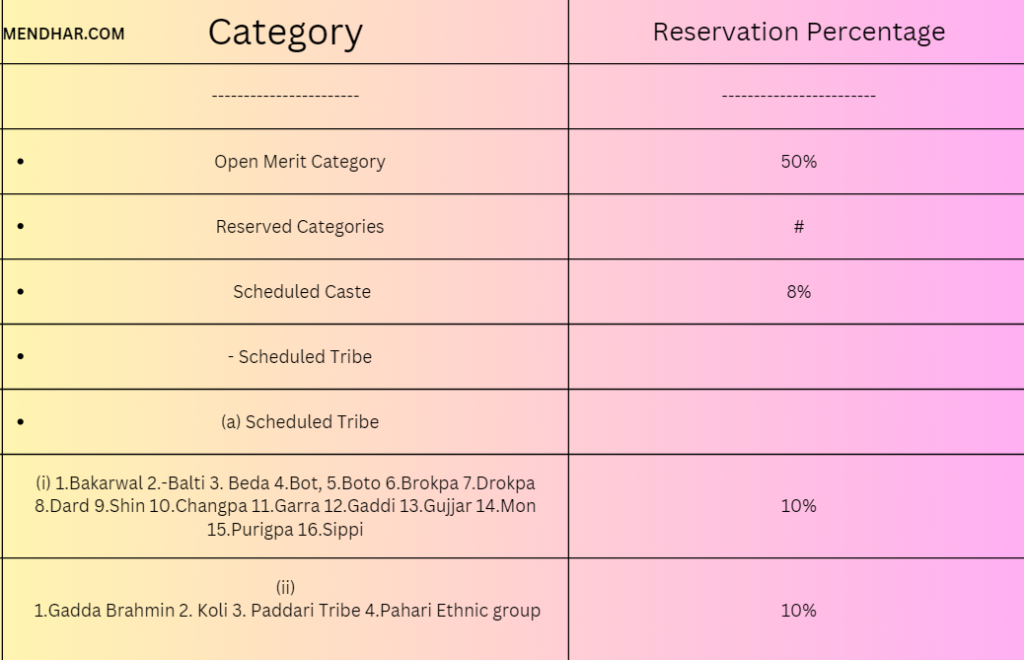Table of Contents
ToggleUnderstanding SO 176 and the Process of Seeking Reservation for Pahari Ethnic Tribes:

In the rich tapestry of India’s cultural heritage, diversity is not just celebrated; it’s cherished as the very essence of our collective identity. Embedded within this diversity are the vibrant traditions and unique identities of numerous ethnic tribes, each contributing to the kaleidoscope of our nation’s heritage. Recognizing the need to safeguard the rights and interests of these communities, Special Order (SO) 176 was enacted, offering reservation benefits to eligible members of Pahari ethnic tribes. In this blog,”SO 176 and the Process of Seeking Reservation for Pahari Ethnic Tribes” we delve into the significance of SO 176 and shed light on the process through which individuals can apply for a certificate under the Pahari ethnic tribe category.
SO 176: A Beacon of Inclusivity
Special Order 176, often abbreviated as SO 176, stands as a testament to India’s commitment to inclusivity and social justice. Enacted to address the unique socio-economic challenges faced by certain marginalized communities, SO 176 extends reservation benefits to eligible members of Pahari ethnic tribes. This special provision aims to empower these communities by ensuring their representation in various spheres of public life, including education, employment, and governance.

Who is Eligible to Seek Reservation under SO 176?
The inclusion of the Gadda Brahmin, Koli, Paddari Tribe, and Pahari Ethnic Group in the Constitution (Jammu and Kashmir) Scheduled Tribe Order (Amendment) Act, 2024, expands the scope of recognized tribal communities eligible for reservation benefits in Jammu and Kashmir. These communities have been specifically identified and acknowledged within the legal framework, acknowledging their distinct cultural, social, and economic backgrounds.
The Gadda Brahmin, Koli, and Paddari Tribe are now officially recognized as Scheduled Tribes in Jammu and Kashmir, alongside the previously recognized Pahari Ethnic Group. This recognition reflects an acknowledgment of their historical marginalization and the need for affirmative action measures to address their socio-economic challenges.
Individuals belonging to these newly recognized tribes are now eligible to avail themselves of reservation benefits provided by the government. To access these benefits, individuals must demonstrate their affiliation with one of these tribes through documented evidence, such as ancestral lineage or community affiliation, similar to the process outlined for the Pahari ethnic tribes under SO 176.
By expanding the list of recognized tribes, the Amendment Act aims to ensure greater inclusivity and equity in the distribution of resources and opportunities, thereby promoting the overall development and welfare of these communities within the framework of Jammu and Kashmir’s socio-political landscape.

The Process of Applying for a Certificate under Pahari Ethnic Tribe Category
Gathering Necessary Documents: The first step in the application process involves gathering essential documents to establish one’s eligibility as a member of a Pahari ethnic tribe. These documents may include birth certificates, community certificates, and any other relevant proof of ancestral lineage or community affiliation.
Application Submission: Once the required documents are assembled, applicants can submit their application for a certificate under the Pahari ethnic tribe category. The application process typically involves filling out a prescribed form provided by the concerned government authority responsible for tribal affairs.
Verification and Scrutiny: Upon receiving the application, the designated authority conducts a thorough verification and scrutiny process to validate the applicant’s claims of belonging to a Pahari ethnic tribe. This may involve cross-referencing with existing records and conducting field inquiries, if necessary.
Issuance of Certificate: If the verification process confirms the applicant’s eligibility, a certificate under the Pahari ethnic tribe category is issued to them. This certificate serves as official documentation of their tribal affiliation and qualifies them for reservation benefits as per the provisions of SO 176.

Applying Online for Certificates through Jansugam Portal:
Jansugam, accessible at https://jansugam.jk.gov.in, is a revolutionary platform built on the ServicePlus meta-data-based e-Service delivery framework. It utilizes LowCode–NoCode (LCNC) architecture to streamline the delivery of electronic services to citizens, including the issuance of certificates. Here’s a step-by-step guide on how to apply online for a certificate through the Jansugam portal:
Accessing the Portal: Visit the official website of Jansugam by typing https://jansugam.jk.gov.in into your web browser’s address bar.
Registration/Login: If you’re a new user, you’ll need to register on the portal by providing basic details such as your name, email address, and mobile number. Once registered, log in to your account using the credentials provided.
Selecting the Certificate Service: Navigate to the section of the portal dedicated to certificate services. Here, you’ll find a list of available certificates that can be applied for online.
Choosing the Certificate Type: Identify the specific type of certificate you wish to apply for. In the context of this guide, select the option for Pahari ethnic tribe certificate.
Filling out the Application Form: Click on the designated option to initiate the application process for the Pahari ethnic tribe certificate. You’ll be presented with an online application form to fill out.
Personal Information: Provide your personal details as required, including your full name, date of birth, residential address, and contact information.
Ancestral Lineage Details: Furnish information regarding your ancestral lineage, if applicable. This may include details about your family members and their affiliations with the Pahari ethnic tribe.
Uploading Documents: Prepare digital copies of the necessary documents, such as proof of identity, residence, and any other supporting documents required to establish your eligibility for the certificate. Upload these documents as per the portal’s instructions.
Verification and Submission: Review the information entered in the application form to ensure accuracy and completeness. Once satisfied, submit the application electronically through the portal.
Payment of Fees (if applicable): Depending on the policies of the issuing authority, there may be associated fees for processing the certificate application. If required, proceed to make the necessary payment through the portal using the available payment options.
Application Tracking: After submission, you’ll receive a unique application reference number or acknowledgment receipt. Keep this number handy as it will allow you to track the status of your application online through the portal.
Processing and Issuance: The designated authority will proceed to verify the details provided in your application and review the submitted documents. Once the verification process is complete and your eligibility is confirmed, the Pahari ethnic tribe certificate will be generated and issued through the Jansugam portal.
Download and Print: Upon successful processing, you’ll be notified through the portal regarding the availability of your certificate. Log in to your account, locate the certificate section, and download the digitally signed certificate. You can then print the certificate for your records and official use.
By following these steps, applicants can seamlessly apply for certificates, including the Pahari ethnic tribe certificate, through the Jansugam portal, leveraging its user-friendly interface and efficient service delivery mechanism.
Frequently Asked Questions (FAQ) about Applying for Certificates through Jansugam Portal:
What is Jansugam?
- Jansugam is an online portal developed by the government of Jammu and Kashmir, designed to facilitate the delivery of electronic services to citizens. It utilizes the ServicePlus meta-data-based e-Service delivery framework, offering a user-friendly platform for various administrative processes, including the application for certificates.
What types of certificates can I apply for through the Jansugam portal?
- The Jansugam portal provides access to a range of certificates, including birth certificates, domicile certificates, income certificates, caste certificates, and various other documents required for official purposes.
How do I register on the Jansugam portal?
- To register on the Jansugam portal, visit the official website and look for the registration option. Provide the required details, such as your name, email address, mobile number, and create a password to complete the registration process.
Can I apply for a certificate online through the Jansugam portal?
- Yes, the Jansugam portal allows citizens to apply for certificates online, eliminating the need for physical visits to government offices. The online application process is streamlined and user-friendly.
What documents do I need to apply for a certificate through the Jansugam portal?
- The specific documents required may vary depending on the type of certificate you are applying for. Generally, you’ll need proof of identity, proof of residence, and any other documents specified for the particular certificate you are applying for.
Is there a fee for applying for certificates through the Jansugam portal?
- There may be associated fees for processing certificate applications, depending on the type of certificate and the policies of the issuing authority. Any applicable fees can be paid online through the portal.
How can I track the status of my certificate application?
- After submitting your application through the Jansugam portal, you will receive a unique application reference number or acknowledgment receipt. You can use this number to track the status of your application online through the portal.
How will I receive my certificate once it is processed?
- Once your certificate application is processed and approved, you will be notified through the Jansugam portal. You can then download the digitally signed certificate from your account on the portal. Additionally, you may have the option to receive the certificate through email or by post, depending on the preferences you indicated during the application process.



Good
Informative
I applied for My ST Certificate On 18th Of March 2024 . Can anybody tell me when will i get my digitally signed ST Certificate ? I need it before 25th of March For Educational Purpose . If anybody knows please leave a reply here …
Informative
Pingback: Understanding SO 176: Which Castes are Included in the Pahari Ethnic Group? -